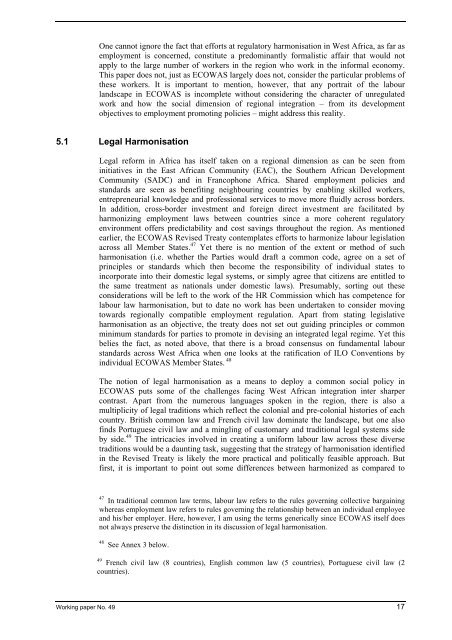The Social Dimension of Regional Integration in ECOWAS
The Social Dimension of Regional Integration in ECOWAS
The Social Dimension of Regional Integration in ECOWAS
Create successful ePaper yourself
Turn your PDF publications into a flip-book with our unique Google optimized e-Paper software.
One cannot ignore the fact that efforts at regulatory harmonisation <strong>in</strong> West Africa, as far as<br />
employment is concerned, constitute a predom<strong>in</strong>antly formalistic affair that would not<br />
apply to the large number <strong>of</strong> workers <strong>in</strong> the region who work <strong>in</strong> the <strong>in</strong>formal economy.<br />
This paper does not, just as <strong>ECOWAS</strong> largely does not, consider the particular problems <strong>of</strong><br />
these workers. It is important to mention, however, that any portrait <strong>of</strong> the labour<br />
landscape <strong>in</strong> <strong>ECOWAS</strong> is <strong>in</strong>complete without consider<strong>in</strong>g the character <strong>of</strong> unregulated<br />
work and how the social dimension <strong>of</strong> regional <strong>in</strong>tegration – from its development<br />
objectives to employment promot<strong>in</strong>g policies – might address this reality.<br />
5.1 Legal Harmonisation<br />
Legal reform <strong>in</strong> Africa has itself taken on a regional dimension as can be seen from<br />
<strong>in</strong>itiatives <strong>in</strong> the East African Community (EAC), the Southern African Development<br />
Community (SADC) and <strong>in</strong> Francophone Africa. Shared employment policies and<br />
standards are seen as benefit<strong>in</strong>g neighbour<strong>in</strong>g countries by enabl<strong>in</strong>g skilled workers,<br />
entrepreneurial knowledge and pr<strong>of</strong>essional services to move more fluidly across borders.<br />
In addition, cross-border <strong>in</strong>vestment and foreign direct <strong>in</strong>vestment are facilitated by<br />
harmoniz<strong>in</strong>g employment laws between countries s<strong>in</strong>ce a more coherent regulatory<br />
environment <strong>of</strong>fers predictability and cost sav<strong>in</strong>gs throughout the region. As mentioned<br />
earlier, the <strong>ECOWAS</strong> Revised Treaty contemplates efforts to harmonize labour legislation<br />
across all Member States. 47 Yet there is no mention <strong>of</strong> the extent or method <strong>of</strong> such<br />
harmonisation (i.e. whether the Parties would draft a common code, agree on a set <strong>of</strong><br />
pr<strong>in</strong>ciples or standards which then become the responsibility <strong>of</strong> <strong>in</strong>dividual states to<br />
<strong>in</strong>corporate <strong>in</strong>to their domestic legal systems, or simply agree that citizens are entitled to<br />
the same treatment as nationals under domestic laws). Presumably, sort<strong>in</strong>g out these<br />
considerations will be left to the work <strong>of</strong> the HR Commission which has competence for<br />
labour law harmonisation, but to date no work has been undertaken to consider mov<strong>in</strong>g<br />
towards regionally compatible employment regulation. Apart from stat<strong>in</strong>g legislative<br />
harmonisation as an objective, the treaty does not set out guid<strong>in</strong>g pr<strong>in</strong>ciples or common<br />
m<strong>in</strong>imum standards for parties to promote <strong>in</strong> devis<strong>in</strong>g an <strong>in</strong>tegrated legal regime. Yet this<br />
belies the fact, as noted above, that there is a broad consensus on fundamental labour<br />
standards across West Africa when one looks at the ratification <strong>of</strong> ILO Conventions by<br />
<strong>in</strong>dividual <strong>ECOWAS</strong> Member States. 48<br />
<strong>The</strong> notion <strong>of</strong> legal harmonisation as a means to deploy a common social policy <strong>in</strong><br />
<strong>ECOWAS</strong> puts some <strong>of</strong> the challenges fac<strong>in</strong>g West African <strong>in</strong>tegration <strong>in</strong>ter sharper<br />
contrast. Apart from the numerous languages spoken <strong>in</strong> the region, there is also a<br />
multiplicity <strong>of</strong> legal traditions which reflect the colonial and pre-colonial histories <strong>of</strong> each<br />
country. British common law and French civil law dom<strong>in</strong>ate the landscape, but one also<br />
f<strong>in</strong>ds Portuguese civil law and a m<strong>in</strong>gl<strong>in</strong>g <strong>of</strong> customary and traditional legal systems side<br />
by side. 49 <strong>The</strong> <strong>in</strong>tricacies <strong>in</strong>volved <strong>in</strong> creat<strong>in</strong>g a uniform labour law across these diverse<br />
traditions would be a daunt<strong>in</strong>g task, suggest<strong>in</strong>g that the strategy <strong>of</strong> harmonisation identified<br />
<strong>in</strong> the Revised Treaty is likely the more practical and politically feasible approach. But<br />
first, it is important to po<strong>in</strong>t out some differences between harmonized as compared to<br />
47 In traditional common law terms, labour law refers to the rules govern<strong>in</strong>g collective barga<strong>in</strong><strong>in</strong>g<br />
whereas employment law refers to rules govern<strong>in</strong>g the relationship between an <strong>in</strong>dividual employee<br />
and his/her employer. Here, however, I am us<strong>in</strong>g the terms generically s<strong>in</strong>ce <strong>ECOWAS</strong> itself does<br />
not always preserve the dist<strong>in</strong>ction <strong>in</strong> its discussion <strong>of</strong> legal harmonisation.<br />
48 See Annex 3 below.<br />
49<br />
French civil law (8 countries), English common law (5 countries), Portuguese civil law (2<br />
countries).<br />
Work<strong>in</strong>g paper No. 49 17

















